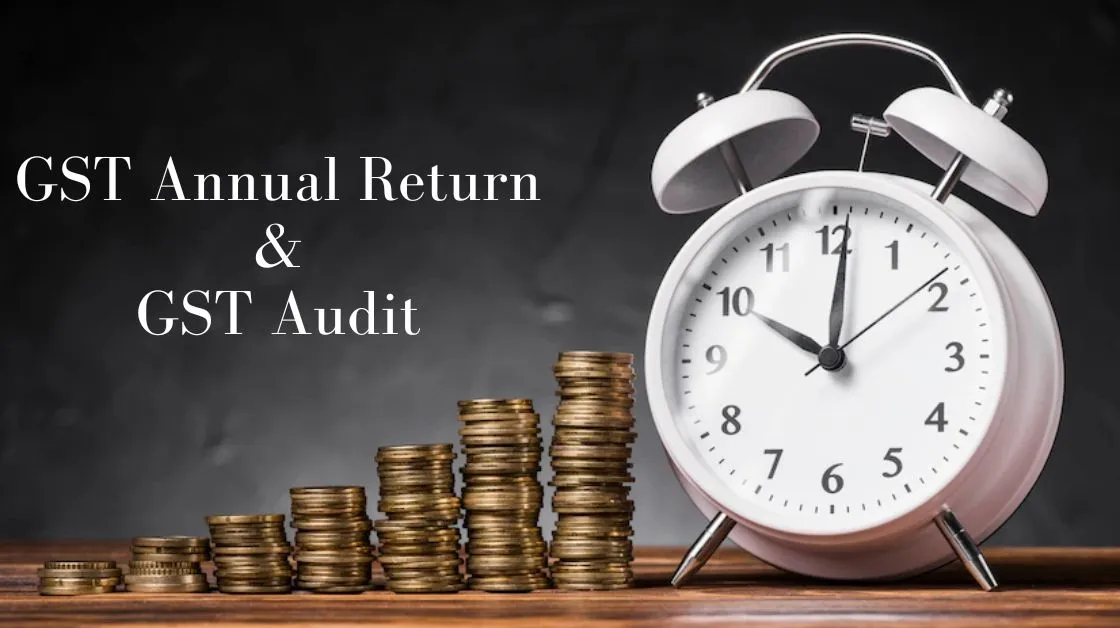GST Annual Return and GST Audit

GST Audit is the procedure of inspection of records, returns, and other documents retained by a taxable person. The objective is to authenticate the accuracy of turnover declared, taxes paid, refund claimed and input tax credit availed, and to evaluate the compliance with the provisions of GST.
GSTR-9 annual return:
- GSTR 9 is an annual return to be filed yearly by taxpayers registered under GST.
- It contains details concerning the outward and inward supplies made/received during the relevant previous year under various tax heads i.e. CGST, SGST & IGST, and HSN codes.
- It is a consolidation of all the monthly/quarterly returns (GSTR-1, GSTR-2A, GSTR-3B) filed in that year. However complicated, this return assists in the extensive reconciliation of data for 100% transparent disclosures.
What are the details required to be filled in the GSTR-9?
- GSTR-9 is divided into 6 parts and 19 sections. Each part asks for details that are easily accessible from your previously filed returns and books of accounts.
- Generally, this form asks for disclosure of annual sales, splitting it amongst the cases that are subject to tax and not subject to tax.
- On the purchase side, the annual value of inward supplies and ITC availed thereon is to be revealed.
- Also, these purchases have to be categorized as inputs, input services, and capital goods. Details of ITC that require to be reversed due to ineligibility are to be entered.
Essentials of GST Annual Return & GST Audit
- Every registered person whose turnover exceeds INR 2 crore in a financial year is required to file GSTR-9. If turnover exceeds INR 5 crore in a Financial Year then the registered person is required to file GSTR-9C along with GSTR-9.
- GST annual reconciliation statement is filed in the form GSTR-9C. Statement of reconciliation between GSTR-9 and the audited annual financial statement is analyzed, while GSTR-9A is the annual return to be filed by those who have opted for the Composition Scheme under GST
- An audit involves an examination of records, returns, and other documents maintained by the registered person. It also ensures the correctness of turnover declared, taxes paid, and refunds claimed. A proprietor, partner, or Board of Directors in the case of a business should engage a GST auditor at the commencement of the financial year.
- GSTR-9C statement of Reconciliation between the annual return in GSTR-9 filed for the financial year and the figures as per the audited annual financial statements of the taxpayer.
How ASC helps?
- Assistance in downloading the desired forms GSTR-1, 2A, 2B, and 3B and comparing them with books of accounts to check mismatches.
- Audit trail of GSTR-9\9C to GSTR-1, 2A, and 3B at the invoice level
- Preparation of a Checklist to identify mismatches & compute the net tax payable.
- Provide technical assistance and representative services during departmental audits.
- Preparation and filing of annual returns through FORM GSTR-9 & 9C.
FREQUENTLY ASKED QUESTIONS
A threshold limit has been decided for the applicability of GST annual return and audits. GST annual return shall be filed by taxpayers whose turnover exceeded Rs. 2 crores in a financial year. GST audit has been removed from the GST law. However, the GSTR-9C reconciliation statement is still applicable to taxpayers on a self-certification basis. Taxpayers whose turnover exceeded Rs. 5 crores are required to file GSTR-9C on a self-certification basis.
GSTR-9 is the annual return (for regular taxpayers) whereas GSTR-9C is a reconciliation statement. The GST annual return is nothing but a consolidated summary of the turnover, ITC, tax paid, and late fees paid during the financial year along with the amendments carried out after the end of the financial year. GSTR-9C functions as a reconciliation statement for the turnover, tax paid, ITC, etc., and the reasons for the mismatch, if any.
Taxpayers are required to file the GST annual return and reconciliation statement within 9 months after the end of the financial year. Therefore, for the financial year ended on 31st March 2022, the GST annual return filing due date as well as the reconciliation statement in GSTR-9C shall be filed on or before 31st December 2022.
No. GSTR-9 is the annual return only for regular taxpayers. For composition taxpayers, GSTR-9A acted as an annual return. However, after the introduction of GSTR-4, GSTR-9A has been disabled. Further, GSTR-9B acts as the annual return for e-commerce operators.
